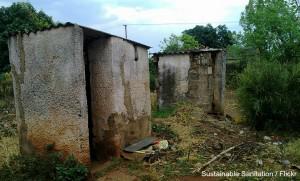SAHRC: Water, sanitation services in crisis


This is according to the SA Human Rights Commission’s (SAHRC) report on access to water and sanitation, launched yesterday in Cape Town,
The report was dedicated to six-year-old Michael Komape, who died after falling into a school pit toilet in Chebeng Village in Limpopo last month.
Rosina Komape, Michael’s mother, broke down as she addressed the launch, explaining that the toilet her son died in was an open hole without a seat, situated in bush quite a distance from the school buildings.
“The last thing I saw before I fainted was Michael’s hand sticking out of the toilet,” said Komape, when describing how she and her son’s classmate found Michael inside the pit.
The report was compiled after the SAHRC held provincial hearings in all nine provinces during 2012 and 2013 in response to widespread complaints about lack of access to water and sanitation.
The most common complaint was “non-functioning or defective intrastructure”, according to the report.
“Mostly, communities complained of broken taps, pipes and toilets that were never maintained or repaired by municipalities.”
There were also widespread complaints about water and waste water treatment plants, which were “poorly maintained and not designed to meet the needs of a growing population”.
In Gauteng, the commission was told that waste-water treatment plants were running at either full capacity or overflowing. Only 33 sewerage works were completely functional, and in Free State none were working.
According to the report:
- Some 1.4 million households (more than one in 10) do not have and have never had any sanitation services.
- At least a quarter of households in formal areas do not have adequate sanitation “due to the deterioration of infrastructure caused by lack of technical ability to ensure effective operation, maintenance and refurbishment.”
- Water provision in 23 municipalities (9 percent of total) was in crisis “with an acute risk of disease, ”while a further 38 percent were at high risk of deteriorating into crisis.
SAHRC deputy chairperson Pregs Govender said that, 20 years into democracy, those who did not have water and sanitation followed “the old apartheid map” and were located in former homelands, townships and informal settlements.
[quote float=”right”]“The last thing I saw before I fainted was Michael’s hand sticking out of the toilet.”
She called on government to ensure that poor communities were prioritised over business and agriculture.
“In Madibeng in North West, there are four dams and it is a rich platinum area. But it took a crisis, in which four people were shot in protests, for water to be redirected from the mines to the community,” Govender told Health-e.
She added that big mining companies, business and agribusiness consumed most of the country’s water, and that they often wasted a lot of water.
Receiving the report, Human Settlements Minister Connie September said the government aimed to eradicate the bucket system by the end of this month.
“The failure of government to have a comprehensive approach to water and sanitation is undermining development,” said September, saying that the report would assist government.
“There is an inter-ministerial committee that meets every time that Cabinet meets to discuss the water and sanitation roll-out,” said September.
An edited version of this article first appeared in the 12 March edition of The Star newspaper.
Read Health-e’s survey of school toilets in National Health Insurance pilot districts
Author
Republish this article
This work is licensed under a Creative Commons Attribution-NoDerivatives 4.0 International License.
Unless otherwise noted, you can republish our articles for free under a Creative Commons license. Here’s what you need to know:
You have to credit Health-e News. In the byline, we prefer “Author Name, Publication.” At the top of the text of your story, include a line that reads: “This story was originally published by Health-e News.” You must link the word “Health-e News” to the original URL of the story.
You must include all of the links from our story, including our newsletter sign up link.
If you use canonical metadata, please use the Health-e News URL. For more information about canonical metadata, click here.
You can’t edit our material, except to reflect relative changes in time, location and editorial style. (For example, “yesterday” can be changed to “last week”)
You have no rights to sell, license, syndicate, or otherwise represent yourself as the authorized owner of our material to any third parties. This means that you cannot actively publish or submit our work for syndication to third party platforms or apps like Apple News or Google News. Health-e News understands that publishers cannot fully control when certain third parties automatically summarise or crawl content from publishers’ own sites.
You can’t republish our material wholesale, or automatically; you need to select stories to be republished individually.
If you share republished stories on social media, we’d appreciate being tagged in your posts. You can find us on Twitter @HealthENews, Instagram @healthenews, and Facebook Health-e News Service.
You can grab HTML code for our stories easily. Click on the Creative Commons logo on our stories. You’ll find it with the other share buttons.
If you have any other questions, contact info@health-e.org.za.
SAHRC: Water, sanitation services in crisis
by kerrycullinan, Health-e News
March 12, 2014



